2016年春八年级英语上册Unit1MeandMyClassLesson6Jenny’sWeek导学案(无答案)(新版)冀教版
冀教版英语八上Unit 1《Me and My Class》(Lessons 5、6)教学设计
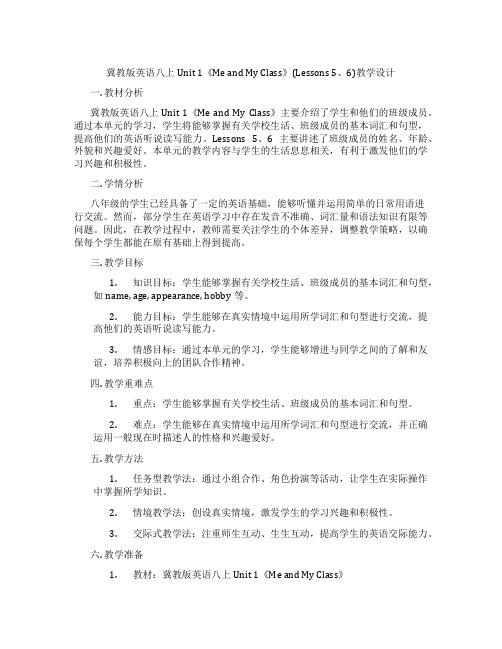
冀教版英语八上Unit 1《Me and My Class》(Lessons 5、6)教学设计一. 教材分析冀教版英语八上Unit 1《Me and My Class》主要介绍了学生和他们的班级成员。
通过本单元的学习,学生将能够掌握有关学校生活、班级成员的基本词汇和句型,提高他们的英语听说读写能力。
Lessons 5、6主要讲述了班级成员的姓名、年龄、外貌和兴趣爱好。
本单元的教学内容与学生的生活息息相关,有利于激发他们的学习兴趣和积极性。
二. 学情分析八年级的学生已经具备了一定的英语基础,能够听懂并运用简单的日常用语进行交流。
然而,部分学生在英语学习中存在发音不准确、词汇量和语法知识有限等问题。
因此,在教学过程中,教师需要关注学生的个体差异,调整教学策略,以确保每个学生都能在原有基础上得到提高。
三. 教学目标1.知识目标:学生能够掌握有关学校生活、班级成员的基本词汇和句型,如name, age, appearance, hobby等。
2.能力目标:学生能够在真实情境中运用所学词汇和句型进行交流,提高他们的英语听说读写能力。
3.情感目标:通过本单元的学习,学生能够增进与同学之间的了解和友谊,培养积极向上的团队合作精神。
四. 教学重难点1.重点:学生能够掌握有关学校生活、班级成员的基本词汇和句型。
2.难点:学生能够在真实情境中运用所学词汇和句型进行交流,并正确运用一般现在时描述人的性格和兴趣爱好。
五. 教学方法1.任务型教学法:通过小组合作、角色扮演等活动,让学生在实际操作中掌握所学知识。
2.情境教学法:创设真实情境,激发学生的学习兴趣和积极性。
3.交际式教学法:注重师生互动、生生互动,提高学生的英语交际能力。
六. 教学准备1.教材:冀教版英语八上Unit 1《Me and My Class》2.多媒体设备:电脑、投影仪、音响等3.教学课件:制作与教材内容相关的课件,包括图片、视频、音频等4.学习用品:笔记本、铅笔、橡皮等七. 教学过程1.导入(5分钟)利用课件展示一组班级成员的图片,引导学生猜测他们的姓名、年龄、外貌和兴趣爱好。
英语八年级上册冀教版unit1lesson6教案及配套练习题

冀教版八年级上册英语Unit1Lesson6教案及配套练习题Unit 1 Me and My ClassLesson 6 Meet Ms. LiuⅠ.Teaching content:1.New words and phrases: A: Mr./ Mrs./ Ms. , special, husband, piano, singer, nervous. ( used freely) B:finish, introduce, English (for oral English)2.Introduction of a teacherⅡ.Teaching goals1.Master the new words: Mr./ Mrs./ Ms. , special, husband, piano, singer, nervous.2. Learn how to introduce a teacher.3. Some useful expressions: using Mr./Mrs./Ms. in the correct wayⅢ.Key points:Now he is ready to introduce someone to the classI talked to someone very special.Walking to school in January.Don’t be nervous.Ⅳ.Difficult points: How to present a good introduction of a teacherⅤ.Preparation:1. Write down the key new words on cards.2.Prepare something in our daily life or draw some pictures3.Find some photos o f famous hosts or hostesses in magazines, like Wang Xiaoya, Li Yong and so onⅥ.Teaching resources: photo, word cards, some pictures, recorder and slide projectorⅦ.Type of the lesson: speaking and practisingⅧ.Teaching procedure1.War ming up1)GreetingsT: Hi, class! Good morning. How are you doing today? It’s September now, not hot and cold. I like autumn in the four seasons of year. And remember we need to wear different clothes in different seasons.2) A brief review of yesterday’s lesson3)Duty reportT: Who’s on duty today? Introduce the weather to us today. And describe what clothes your classmates are wearing.2.New lessonStep 1: Lead in(Show the photo of Wang Xiaoya)T: You like her very much, yes? Me, too! Would you like to talk to her? We’ve learned how to interview someone. Imagine you’ve interviewed Wang Xiaoya. And then you are asked to introduce her to your class. Do you know what we want to know about her?Guide the Ss to know the way of introducing someone with some questions:1)Where does she live? (She works in CCTV, so she lives in Beijing.)2)What does she do? (She a good hostess of “Quiz Show” on TV.)3)What is she good at? (She is good at hosting.)4)How is she doing her work? (She works very well. Others even learn from her and her program)5)How do you like her? (She always smiles and I like her very much.)Step 2: key point: introduce how to use Mr./Mrs./Ms correct ly(Show a photo of a family)T: Look at this photo, please. It’s a photo of the famou s host of Li Yong. Who is the lady besides him? Yes, his wife. And this little girl is their daughter. I can call Li Yong “Mr. Li”. Do you know what we can call his wife? Right! “Mrs. Li”. So what about his daughter?(Let the Ss try to guess. Maybe some of them know the answer. Then guide them to be aware of the differences of the three words.)T: Good, so let’s summarize the usage of the three words: We use “Mr.” before his family name. No matter he is married or not. But we only call a married woman “Mrs.” Right? Then what about a girl, an unmarried one? Yes. Very good. We call a girl “Miss”. We can call a lady “Ms.x” if we don’t know whether she is married or not.Step 3: Discussion of questions in “Think About It!”T: There are some questions for us to discuss on top of Page 8. Read them and think about it. You can discuss with you partners. Then take tur ns to speak for a introduction.Step 4: Listen and useful informationT: Li Ming will talk on the tape. He also introduced a teacher, Ms. Liu. Listen for the first time and get the answer to this question: How long has Ms. Liu lived inShijiazhuang? (For two years) Step 5: Further study of the textT: Read the text by yourselves, please, and try to get the inf ormation about Ms. Liu as much as possible. Ask me what you can’t understand.Step 6: Discussion and understandingGuide the Ss to discuss the text about Ms. Liu. Check them whether they can understand the text well. The following detailed questions are available:1)How does Ms Liu’s students like her? ( Her students like her very much.)2)How long has she been an English teacher? ( For seven years.)3)Does she always live in China? (No. She once went to school in London to learn English.)4)What food does Ms. Liu like? (Dumplings)__________________________5.Is she a very good singer?__________________________二、英汉互译。
冀教版-英语-八上-1单元 Me and My Class-第6课课文讲解及练习
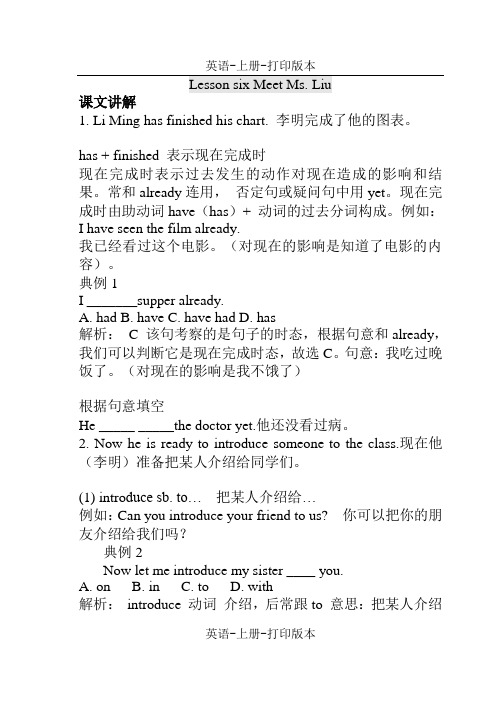
1. Li Ming has finished his chart. 李明完成了他的图表。
has + finished 表示现在完成时现在完成时表示过去发生的动作对现在造成的影响和结果。
常和already连用,否定句或疑问句中用yet。
现在完成时由助动词have(has)+ 动词的过去分词构成。
例如:I have seen the film already.我已经看过这个电影。
(对现在的影响是知道了电影的内容)。
典例1I _______supper already.A. hadB. haveC. have hadD. has解析:C 该句考察的是句子的时态,根据句意和already,我们可以判断它是现在完成时态,故选C。
句意:我吃过晚饭了。
(对现在的影响是我不饿了)根据句意填空He _____ _____the doctor yet.他还没看过病。
2. Now he is ready to introduce someone to the class.现在他(李明)准备把某人介绍给同学们。
(1) intro duce sb. to… 把某人介绍给…例如:Can you introduce your friend to us? 你可以把你的朋友介绍给我们吗?典例2Now let me introduce my sister ____ you.A. onB. inC. toD. with解析:introduce 动词介绍,后常跟to 意思:把某人介绍英语-上册-打印版本给…故选:C.句意:现在让我把我的姐姐介绍跟你们。
变式演练Before having class, Please introduce yourself ____ us.A. onB. inC. toD. with(2) be ready to do sth 准备做某事。
I am ready to have English lessons. 我准备上英语课。
八年级英语上Unit1MeandMyClassLesson6Jenny'sWeek习题冀教
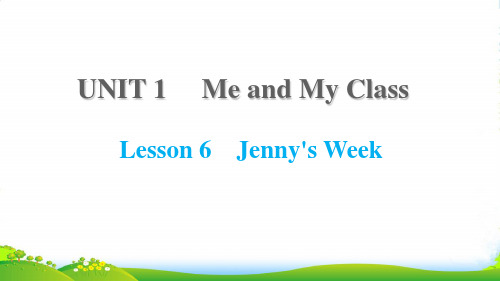
12. are, music, we, to, listening ___W__e__a_re__li_s_te_n_i_n_g__to__m_u__si_c_(主__语__+__谓__语___+__宾__语__) .
13. they, happy, very, feel ____T_h__ey__f_ee_l_v_e_r_y__h_a_p_p_y_(_主__语__+__系__动__词__+__表__语__)_.
A. reading
B. read
C. to read
D. reads
Ⅲ. 单元语法专练(连词成句,并写出该句属于简单 句的哪种句型)。
11. hard, I, brother, my, work, and ____M_y__b_r_o_t_h_e_r_a_n_d__I_w_o_r_k__h_a_r_d_(_主__语__+__谓__语__)____.
birthday yesterday.
4. What a __w__in__d_y__ (wind) day today! We’d better stay at home.
5. We got ____lo_s_t___ (lose) in the city when we went there for the first time.
13 They feel very happy(主语+系动词+表语) 14 Can you pass me the book(主语+谓语+间接宾语
+直接宾语) 15 Tom invited me to his party(主语+谓语+宾语+宾补)
16 B 17 C 18 B 19 D 20 A
答案呈现
17. If we are with friends, we should often ___C____ when
Unit1MeandMyClass(lesson6)课件(冀教版八年级上册)

1. How long has Ms. Liu been an English teacher?
2. Where did she go to learn English? England.
3. How long has she lived in Shijiazhuang?
4. Who does she live with? Her husband and
Taiwan Island. A singer. Singing. Well. Very much.
Think about it!
1. What do you know about your English teacher? 2. How do you feel when you talk in front of your
4. introduce sb. to sb.
some one very special
adj.特别的,专门的,如:
Is there any thing special in today’s newspaper?
nervous
学科网
adj 紧张的,害怕的
He seems a bit nervous
Peter will marry Emily next month
My uncle and aunt have been married for ten years
Correct the mistakes: 1. He is ready t_o_class. for 2. I talked to v_e_r_y__sp__ec_i_a_l_s_o_m_e_o_n_e_.
5. What does she like?
daughter.
2016年春八年级英语上册 Unit 1 Me and My Class Lesson 6 Jenn

2. local名词是副词是
Translation between English and Chinese
1.向某人介绍
_____________________2.给某人买某物______________________
3.邀请某人去某地_____________________
合作探究·展示反馈
I’m the best![我最棒]
jeans:(n,)______意思:______
pleasure(n.)______意思:______
local(adj)______意思:______
(n.)______意思:______
I show my happiness.【我展示,我快乐!】
2.We'd better check on the match in thelpaper...
我们最好在本地报纸上查一下这场比赛。
Learn and use [活学活用]
1我想给妈妈买个生日礼物
2他很高兴和张老师交谈.
3,她昨天邀请我去二中
I ‘m young writer[我是小作家!
选做:朗读对话,仿写一篇日记,题目自拟
2) Learn to use the General Past Tense to describe activities in the past.
3.★Teaching procedures
【New Languages】
自主学习·质疑交流
Words单词
Phrases短语或结构
Sentences句子
随堂记录(收获、问题)
Write the new words:
重点单词
1.pleasure.She took nopleasurein her work.
unit1meandmyclasslesson6meetmsliu教案冀教版八年级上

Lesson 6 Meet Ms. LiuⅠ.Teaching content:1.New words and phrases: A: Mr./ Mrs./ Ms. , special, husband, piano, singer, nervous. ( used freely) B: finish, introduce, English (for oral English)1. Introduction of a teacherⅡ.Teaching goals1. Master the new words: Mr./ Mrs./ Ms. , special, husband, piano, singer, nervous.2. Learn how to introduce a teacher.3. Some useful expressions: using Mr./Mrs./Ms. in the correct wayⅢ.Key points:Now he is ready to introduce someone to the classI talked to someone very special.Walking to school in January.Don’t be nervous.Ⅳ.Difficult points: How to present a good introduction of a teacherⅤ.Preparation:1. Write down the key new words on cards.2. Prepare something in our daily life or draw some pictures3. Find some photos of famous hosts or hostesses in magazines, like Wang Xiaoya, Li Yong and so onⅥ.Teaching resources: photo, word cards, some pictures, recorder and slide projector Ⅶ.Type of the lesson: speaking and practisingⅧ.Teaching procedure1. Warming up1) GreetingsT: Hi, class! Good morning. How are you doing today? It’s September now, not hot and cold. I like autumn in the four seasons of year. And remember we need to wear different clothes in different seasons.2) A b rief review of yesterday’s lesson3) Duty reportT: Who’s on duty today? Introduce the weather to us today. And describe what clothes your classmates are wearing.2. New lessonStep 1: Lead in(Show the photo of Wang Xiaoya)T: You like her very mu ch, yes? Me, too! Would you like to talk to her? We’ve learned how to interview someone. Imagine you’ve interviewed Wang Xiaoya. And then you are asked to introduce her to your class. Do you know what we want to know about her?Guide the Ss to know the way of introducing someone with some questions:1) Where does she live? (She works in CCTV, so she lives in Beijing.)2) What does she do? (She a good hostess of “Quiz Show” on TV.)3) What is she good at? (She is good at hosting.)4) How is she doing her work? (She works very well. Others even learn from her and her program)5) How do you like her? (She always smiles and I like her very much.)Step 2: key point: introduce how to use Mr./Mrs./Ms correctly(Show a photo of a family)T: Look at this photo, please. It’s a photo of the famous host of Li Yong. Who is the lady besides him? Yes, his wife. And this little girl is their daughter. I can call Li Yong “Mr. Li”. Do you know what we can call his wife? Right! “Mrs. Li”. So what about his daughter?(Let the Ss try to guess. Maybe some of them know the answer. Then guide them to be aware of the differences of the three words.)T: Good, so let’s summarize the usage of the three words: We use “Mr.” before his family name. No matter he is married or not. But we only call a married woman “Mrs.” Right? Then what about a girl, an unmarried one? Yes. Very good. We call a girl “Miss”. We can call a lady “Ms.x” if we don’t know whether she is married or not.Step 3: Discussion of questions in “Think About It!”T: There are some questions for us to discuss on top of Page 8. Read them and think about it. You can discuss with you partners. Then take turns to speak for a introduction.Step 4: Listen and useful informationT: Li Ming will talk on the tape. He also introduced a teacher, Ms. Liu. Listen for the first time and get the answer to this question: How long has Ms. Liu lived in Shijiazhuang? (For two years)Step 5: Further study of the textT: Read the text by yourselves, please, and try to get the information about Ms. Liu as much as possible. Ask me what you can’t understand.Step 6: Discussion and understandingGuide the Ss to discuss the text about Ms. Liu. Check them whether they can understand the text well. The following detailed questions are available:1) How does Ms Liu’s students like her? ( Her students like her very much.)2) How long has she been an English teacher? ( For seven years.)3) Does she always live in China? (No. She once went to school in London to learn English.)4) What food does Ms. Liu like? (Dumplings)5) What’s her favourite animal? (Monkeys)6) Does she have many interests? Give us some examples. (Yes. Ms. Liu has many interests. She likes swim , the piano and she sings well.)7) What does Ms. Liu hate to do? (She hates walking to school in January, because it’s cold.)Step 7: card-makingT: After the discussion, we have know Ms. Liu very well. Now take out a piece of paper. Let’s make a personal card for Ms. Liu.(Present the card by using the slide projector)Give the Ss these expressions for introducing their teacher: My favourite teacher is . He/She likes and hates . His/Her favourite is .3.Homework1) Read the text2) Make a card like the one of Ms. Liu after classFinish off the exercises in activity book.。
冀教版八年级上册英语精品教学课件 unit1 Me and My Class Lesson 6

知识点
2
知识讲解
pleasure /'pleʒə/ n.快乐;满足
【易错点】
常见短语:have the pleasure of doing sth.意为“很荣幸/高兴做某事”;with pleasure 意为“十分乐意”,常用来表示客气地接受或同意帮助别人时的答语。It's my pleasure. 意为“不客气”。常用于在帮助别人之后别人感谢你时的答语。 eg:He had the pleasure of playing tennis with Nat. 他很荣幸和纳特打网球。
课文呈现
Last Saturday,my mother bought a pair of jeans for ❷ me. She and I love to shop for clothes! She also bought me a purple blouse. I wore my new clothes to school on Monday. Everyone liked them. In English class this morning,we talked to our classmates. I had the pleasure ❸ of talking to Mary —a girl from Hong Kong. Her English is very good. She invited me to go to the movies with her next Sunday. Mary's parents work in a local restaurant. After the movie,we will have supper there. On Wednesday,my cousin Brian is arriving ❹ from the U.K. He will stay with my family for the next two years. Time for bed!
冀教版八年级英语JJ上册精品授课课件 Unit 1 Me and My Class Lesson 6
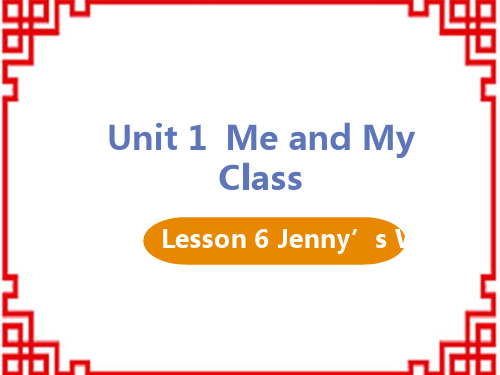
当堂小练
一、词语运用
1. After school this afternooarne, wgoeing to _w_i_ll_p_l_a_y__________ ____p_l_a_y_/(play) basketball.
2. My girlfriend invitetdo mgoe ______ (go) to the mWovailek.ing 3. ___l_o_st___ (walk) after supper is good for you. 4. He ______ (lose) his history book yesterday. 5. —Horwainisy the weather today?
新课讲解
me to go to the movies with her next Sunday. Mary's parents work in a local restaurant. After the movie,we will have supper there. On Wednesday,my cousin Brian is arriving from the U.K. He will stay with my family for the next two years. Time for bed!
_________.
one year
two years
新课讲解
2 Read the lesson and answer the
q1.ueWsthioatndsi.d Jenny do after school today?
She played football.
2.Who was on the same team as Danny? Sandra.
八年级英语上Unit1MeandMyClassLesson6Jenny'sWeek习题课件冀教6

2. 人物介绍类话题常用句型 ① My favourite ... is .../I like ... best. ② She has... ③ She likes... ④ She hates.... ⑤ She encourages us to...
Unit1 Me and My Class
Lesson 6 Jenny's Week
习题链接
温馨提示:点击 进入讲评
课内知识•夯实基础
1 Saturday
6 one; the other
答案呈现
2 cloudy
7 a pair of jeans
3 pleasure
8 the pleasure of talking
5. —So kind of you to give me a ride to the station.
—____B___.
【2021·泸州模拟】
A. Never mind
B. My pleasure
C. It doesn’t matter
D. Glad you like it
二、语法专练 指出下列各句属于哪种基本句型 A. 主语+谓语 B. 主语+系动词+表语 C. 主语+谓语+宾语 D. 主语+谓语+间接宾语+直接宾语 E. 主语+谓语+宾语+宾语补足语 6. They danced. ( A )
1C
6A
2B
7C
3A
8B
4D
9D
5B
10 E
答案呈现
习题链接
课文精华•新编巧练
答案呈现
1 to go
八年级英语上册Unit1MeandMyClassLesson6MeetMsLiu课件冀教版

2019/7/10
最新中小学教学课件
18
Language Points 1. marry
marry sb. 意为“与某人结婚” eg: She married a man with a lot of money. get / be married to sb. 意为“和某人结婚”
eg: When did you get married? She has been married to him for ten years.
5. to learn English 在这个句子中,To learn English是目的状语。动词不定 式在句子中经常可以做目的状语。 6. call me Mrs. Liu 此句中call sb. sth意为“喊某人”, call后面跟的是双宾语。 eg:Please call me John. 请叫我约翰吧。 在英语中有很多动词后面可以跟双宾语。如:give, show,
send, bring, offer, read, pass, lend, hand, tell, write, return 等。 eg:Pass me the salt, please. 请把盐递给我。 I’ll lend you something to read. 我借点书给你看.
7. Walking to school in January. walking to school动名词短语,作hate的宾语。完整的句 子是:Ms. Liu hates walking to school in January. 动名 词还可以放在like, enjoy, finish, prefer等词后面。 eg:I enjoy reading.我喜欢阅读。 He finished working in the lab very late. 他很晚才完成实验室的工作。
冀教版-英语-八上-Unit 1 Me and My Class-Lesson6教案
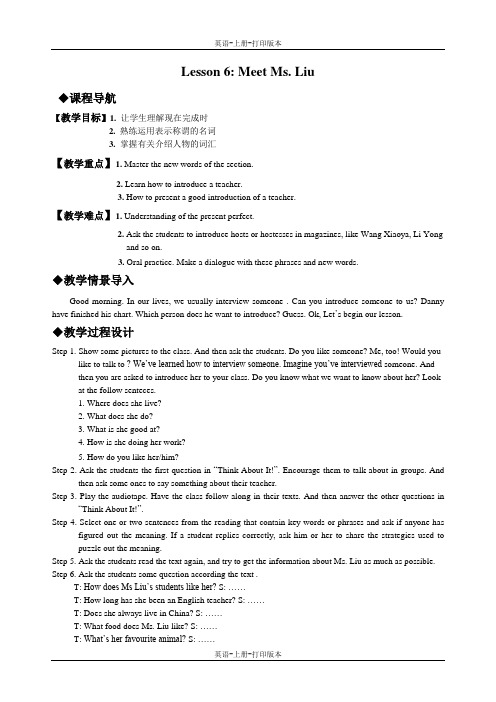
Lesson 6: Meet Ms. Liu◆课程导航【教学目标】1. 让学生理解现在完成时2. 熟练运用表示称谓的名词3.掌握有关介绍人物的词汇【教学重点】1. Master the new words of the section.2. Learn how to introduce a teacher.3. How to present a good introduction of a teacher.【教学难点】1. Understanding of the present perfect.2. Ask the students to introduce hosts or hostesses in magazines, like Wang Xiaoya, Li Yongand so on.3. Oral practice. Make a dialogue with these phrases and new words.◆教学情景导入Good morning. In our lives, we usually interview someone . Can you introduce someone to us? Danny have finished his chart. Which person does he want to introduce? Guess. Ok, Let’s begin our lesson.◆教学过程设计Step 1. Show some pictures to the class. And then ask the students. Do you like someone? Me, too! Would you like to talk to ? We’ve learned how to interview someone. Imagine you’ve interviewed someone. And then you are asked to introduce her to your class. Do you know what we want to know about her? Look at the follow senteces.1. Where does she live?2. What does she do?3. What is she good at?4. How is she doing her work?5. How do you like her/him?Step 2. Ask the students the first question in “Think About It!”. Encourage them to talk about in groups. And then ask some ones to say something about their teacher.Step 3. Play the audiotape. Have the class follow along in their texts. And then answer the other questions in “Think About It!”.Step 4. Select one or two sentences from the reading that contain key words or phrases and ask if anyone has figured out the meaning. If a student replies correctly, ask him or her to share the strategies used to puzzle out the meaning.Step 5. Ask the students read the text again, and try to get the information about Ms. Liu as much as possible. Step 6. Ask the students some question according the text .T: How does Ms Liu’s students like her? S: ……T: How long has she been an English teacher? S: ……T: Does she always live in China? S: ……T: What food does Ms. Liu like? S: ……T: What’s her favourite animal? S: ……T: Does she have many interests? S: ……T: What does Ms. Liu hate to do? S: ……Step 7. Come to “Let’s Do It!”. Encourage the students to use these expressions to introduce some who you have interviewed .Step 8. Homework. Let’s make a personal card for Ms. Liu.◆课堂板书设计Lesson 6: Meet Ms. LiuMs. finish introduce special Mrs. England married husband Mr. piano singernervousintroduce sb. to sb.play the pianocall sb. + n bebe nervousfinish doing sth.◆作业1. Finish the remaining exercises in the activity book.2. Preview the next reading in the student book.3. Make a card like the one of Ms. Liu after class.●教学反思毛泽东曾在《矛盾论》里这样说:“唯物辩证法认为外因是变化的条件,内因是变化的根据,外因通过内因起作用。
冀教版初中英语八年级上册Unit 1 Me and My Class Lesson 6PPT课件

2. The score was four to three. 比分是4:3。 score n./ v.得分 Try to reach the highest score. 尝试达到最高分。 Did I make it? Did I score? 我成功了吗?我得分了吗?
赢得比赛时常用win the game/match;输掉 比赛用lose the match,而击败某人用beat sb. We felt lucky to win the match. 赢得了比赛我们感到很幸运。
1. Jenny’s team ________ the football
game.
wo, Jenny’s mother bought
her ________.
a pair of pants and a blue dress
a pair of jeans and a purple blouse
• What do you like to do after school or on weekends/holidays?
• Do you like to watch movies? What is your favourite movie?
P13 1 Listen and tick the correct answers.
pleasure的动词形式是please;形容词形式 是pleased和pleasant,其中pleased意思是“ 高兴的,满意的”,用来修饰人的感受; pleasant意思是“令人满意的”,用来修饰 事情。 I just want to please you. 我只是想让你高兴。 She seemed pleased. What happened? 她看起来很高兴。怎么了? I often remember the pleasant days in college. 我经常想起大学的愉快时光。
八年级英语上册 Unit 1 Me and My Class Lesson 6 Jenny’s We
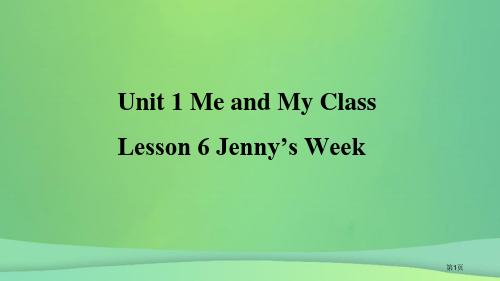
第1页
New words
pleasure local
jeans
n. 愉快,高兴;满足 adj. 当地,当地 n. 当地人 n. 女仔裤
第2页
Listen and read
第3页
Language points
第6页
自主学习要求
学习以上内容,认真完成 1、预习案上习题 2、老师布置讨论作业 What do you like to do after school or on weekends/holidays?
第7页
再见
第8页
第5页
Language points
5.have the pleasure of doing sth.很高兴做某事 我很高兴见到你。 I had the pleasure of meeting you. 【拓展】“With pleasure.”意为“很愿意”,用于回答他人请求或邀请。 “It's a pleasure”意为“别客气;不用谢”,用于回答他人致谢。 6.invite sb. to do sth.邀请某人做某事 他们昨天邀请我留下过周末。 They invited me to stay for the weekend yesterday. 【拓展】invite名词形式是 invitation.
1.on weekends在周末 美国人习惯用: on weekends/ on the weekend 英国人习惯用: at weekends/at the weekend 2.on one team在一个队里 on是介词,意为“为(某团体或组织)一员”。
第4页
- 1、下载文档前请自行甄别文档内容的完整性,平台不提供额外的编辑、内容补充、找答案等附加服务。
- 2、"仅部分预览"的文档,不可在线预览部分如存在完整性等问题,可反馈申请退款(可完整预览的文档不适用该条件!)。
- 3、如文档侵犯您的权益,请联系客服反馈,我们会尽快为您处理(人工客服工作时间:9:00-18:30)。
Lesson 6Jenny’s Week
★Teaching aims:
1.Language goals:A:diary, name, later, parent, invite(four skills)B: one…the other…, go to the movies C: Name: Mary (girl)
随堂记录(收获、问题)
Write the new words:
重点单词
1.pleasure.She took nopleasurein her work.
她觉得自己的工作毫无乐趣。
I really don't know how topleasurehim.
我真不知道如何让他高兴。
Ipleasurein your company.
合作探究·展示反馈
I’m the best![我最棒]
jeans:(n,)______意思:______
pleasure(n.)______意思:______
local(adj)______意思:______
(n.)______iness.【我展示,我快乐!】
2.We'd better check on the match in thelpaper...
我们最好在本地报纸上查一下这场比赛。
Learn and use [活学活用]
1我想给妈妈买个生日礼物
2他很高兴和张老师交谈.
3,她昨天邀请我去二中
I ‘m young writer[我是小作家!
选做:朗读对话,仿写一篇日记,题目自拟
1.句型“have the pleasure of doing”意为“很高兴做。。。。。”
我的句子:
2 buy sth. for sb.
buy sb. sth.
我的句子
3.我认为还需掌握的句型
总结归纳·训练检测
Piercing eye【火眼金睛!】
1May Ihavethepleasureof (dance) with you?
Teaching important points: Learn to use the General Past Tense to describe activities in the past
2.Teaching difficult points: 1) Learn to write a diary talking about daily activities.
4.该到干某事的时候了_____________________
To be a translation company[争当小小翻译家]:
1:你最喜欢的科目是什么
2在周末你喜欢干什么
3.我们输了
4..He will stay with my family for the next two years.
和你在一起我感到高兴。
2. local名词是副词是
Translation between English and Chinese
1.向某人介绍
_____________________2.给某人买某物______________________
3.邀请某人去某地_____________________
2) Learn to use the General Past Tense to describe activities in the past.
3.★Teaching procedures
【New Languages】
自主学习·质疑交流
Words单词
Phrases短语或结构
Sentences句子
